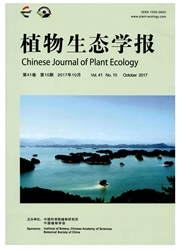

 中文摘要:
中文摘要:
运用pH-drift的方法研究了在不同碱度条件下中华水韭(Isoetes sinensis)的沉水叶片昼夜CO2吸收的特征。结果表明中华水韭的沉水叶片具有昼夜吸收水中CO2的能力,而不具备利用水中的HCO-3的能力,进一步证明了水生植物中华水韭的光合碳同化途径具有景天酸代谢(CAM)的特征。中华水韭沉水叶片光照条件下对水中CO2的吸收速率在一定的浓度范围内正相关于水中的CO2浓度。光照条件下,中华水韭的pH-drift实验的pH补偿点分别为(8.1±0.3)和(7.9±0.1)mmol·L-1,最终[CT]/Alk值为(1.009±0.01)和(1.022±0.004)。碱度对中华水韭夜晚CO2的吸收速率有显著的影响(F=38.73,p〈0.0001)。总碱度1.70mmol·L-1溶液中的中华水韭沉水叶片在相对较低的CO2浓度(0.04±0.001mmol·L-1)水平下即表现出对CO2的净吸收。调查了野外一处中华水韭沉水种群的生境pH值及CO2浓度的昼夜变化,发现水体碱度约为1.59mmol·L-1,一昼夜的pH值波动不大,平均为(6.1±0.04),昼夜CO2浓度存在波动,午夜水中的CO2浓度是午后的近3倍。
 英文摘要:
英文摘要:
Aims Isoetes sinensis Palmer,an endangered aquatic plant in China,possesses a CAM (Crassulacean acid metabolism) photosynthetic pathway in its submerged leaves. Our objectives were to investigate diurnal CO2 exchange characteristics of submerged leaves and to examine if I. sinensis was capable of net CO2 uptake in the dark,which was considered evidence of the CAM pathway in aquatic plants by Keeley (1998),and determine if diurnal CO2 exchange rates were influenced by alkalinity. Results may contribute to conservation of this endangered plant by determining if high alkalinity of wa-ter sources limited population sizes. Methods We used the pH-drift technique to analyze CT (total carbon) and CO2 uptake at two alkalinities in light and dark conditions. Photosynthetic CT/CO2 response curves were measured at 25 °C and 210 μmol.m–2.s–1 and in a solution designed by Smart and Barko (1985) in which concentrations of NaHCO3 and KHCO3 were varied to supply different alkalinities. Leaves were placed in a small glass chamber,each containing a known volume of the solution which was stirred by a magnetic stirrer at the bottom. The pH/unit time was recorded by a pH electrode that had been calibrated at the beginning and the end of each experiment,the alkalinities of the solution was measured by Gran titration (Talling,1973) to determine if alkalinity was constant during each experiment. Plant material was weighed after drying overnight at 80 °C. We calculated the concentration of free CO2 and total carbon based on alka-linity,pH,conductivity and temperature according to Mackereth et al. (1978). With the calculated con-centration of CT (or CO2),unit time,chamber volume and amount of plant material present,a photosyn-thesis or net CO2 exchange rate was obtained. For each alkalinity,the CO2 exchange rate was then plot-ted against the mean concentration of CO2. A covariance approach was used to check if the CO2 ex-change significantly differed at two alkalinities. Important findings Submerged lea
 同期刊论文项目
同期刊论文项目
 同项目期刊论文
同项目期刊论文
 Genetic diversity and population structure of the endangered alpine quillwort Isoetes hypsophila Han
Genetic diversity and population structure of the endangered alpine quillwort Isoetes hypsophila Han Microsatellite analysis reveals the genetic structure and gene flow of the aquatic quillwort Isoetes
Microsatellite analysis reveals the genetic structure and gene flow of the aquatic quillwort Isoetes 期刊信息
期刊信息
